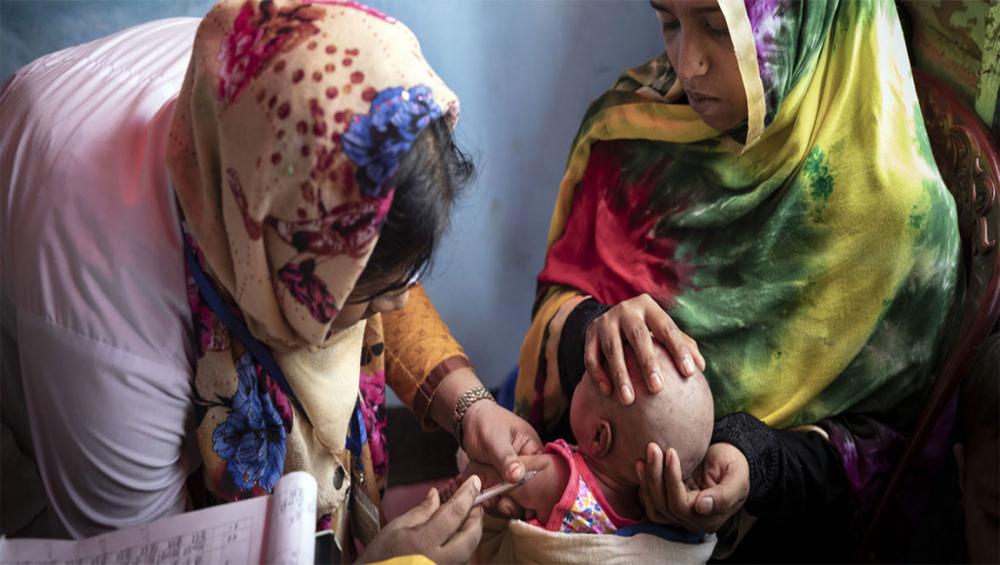Just Earth News | @justearthnews | 19 Aug 2019, 04:30 pm Print

UNICEF/Brown
New York, Aug 19 (IBNS): The work of women humanitarians makes a “huge difference” to the lives of millions of women, men and children in urgent need, the United Nations chief said in his message for World Humanitarian Day.
Marking the official day’s tenth anniversary on Monday, the UN is honouring the contribution of tens of thousands of women humanitarian aid workers who provide life-saving support to vulnerable people caught up in crises in some of the world’s most dangerous places.
The day is commemorated each year on 19 August, the date back in 2003 when the UN headquarters in Baghdad was targeted by a large terrorist truck bomb, killing 22 people, including Sergio Vieira de Mello, the UN’s top representative in Iraq.
This year’s focus salutes the efforts of women humanitarian workers across the world who rally to people in need and are often the first to respond and the last to leave.
“From supporting civilians caught up in crisis to addressing disease outbreaks, women humanitarians are on the front lines”, said Secretary-General António Guterres.
These unsung heroes have long been working in their own communities in some of the most difficult terrains – from the war-wounded in Afghanistan, to the food insecure in the Sahel, to those who have lost their homes and livelihoods in places such as Central African Republic, South Sudan, Syria and Yemen.
“Their presence makes aid operations more effective by increasing their reach”, said the UN chief. “It also improves the humanitarian response to gender-based violence, which increases during emergencies”.
Across the globe, 250,000 aid workers are women – a figure that amounts to more than 40 per cent of the humanitarian workforce. But aid work is becoming increasingly dangerous.
Since August 2003, more than 4,500 aid workers of all genders have been killed, injured, detained, assaulted or kidnapped while carrying out their work. That averages out to five attacks per week.
Moreover, women humanitarians are at particularly high risk of robbery, sexual assault and other violence.
Protect humanitarians
The UN emphasizes that under international law, all humanitarian workers must be safeguarded.
“World leaders, and all parties to conflict, must ensure that humanitarians are protected from harm, as required under international law”, Mr. Guterres stressed.
And yet, serious violations of international humanitarian and human rights law continue around the world, which “must be investigated and prosecuted” always, he added.
As part of this year’s WHD commemorations, the UN and partners are launching the #WomenHumanitarians global campaign to pay special tribute to and raise support for the work women do to save lives and alleviate human suffering.
The campaign tells the stories of 24 women over 24 hours, to show the range and diversity of their roles in humanitarian action. They include a driver in the Central African Republic who brings food to people in need; a woman who provides legal advice to refugee women and children from Somalia; and a midwife in Liberia who has cared for mothers and babies for three decades and has more than 800 girls named after her.
“This World Humanitarian Day, we showcase the commitment and drive of some truly amazing women in the humanitarian community”, said UN humanitarian chief and Emergency Relief Coordinator Mark Lowcock. “The dedication of these women to help the world’s most vulnerable people is admirable, particularly those women who are often the first to respond in their communities when faced with a crisis,”
Today, and for the rest of this month, Mr. Guterres invites everyone to share through their online and social media platforms their own “powerful stories” of humanitarian aid workers to “reaffirm our common commitment to strengthening the role of women in humanitarian operations”.
“On World Humanitarian Day and every day, we stand up for humanitarian workers around the world”, concluded the Secretary-General.
The attack sixteen years ago on UN Headquarters in Iraq was one of the most lethal in the Organization's history, and marked a turning point in how the UN and aid groups operate in the field. Here are hear first-hand accounts from some of the survivors.
Photo caption and credit:
A volunteer at the Primary Health Centre in on of Cox's Bazaar's vast refugee camps inoculates the baby of an 18-year-old mother, Bangladesh 2019.
- UN’s chilling 2024 finding: Women are being killed every 10 minutes — Not by strangers!
- Argentina witnesses mass protests over torture, murder of three women
- New study shows one in three Australian men committed intimate partner violence
- Funding cuts in Afghanistan mean ‘lives lost and lives less lived’
- UN report says Iran using app, tech to monitor women who are not wearing hijab





-1763561110.jpg)
